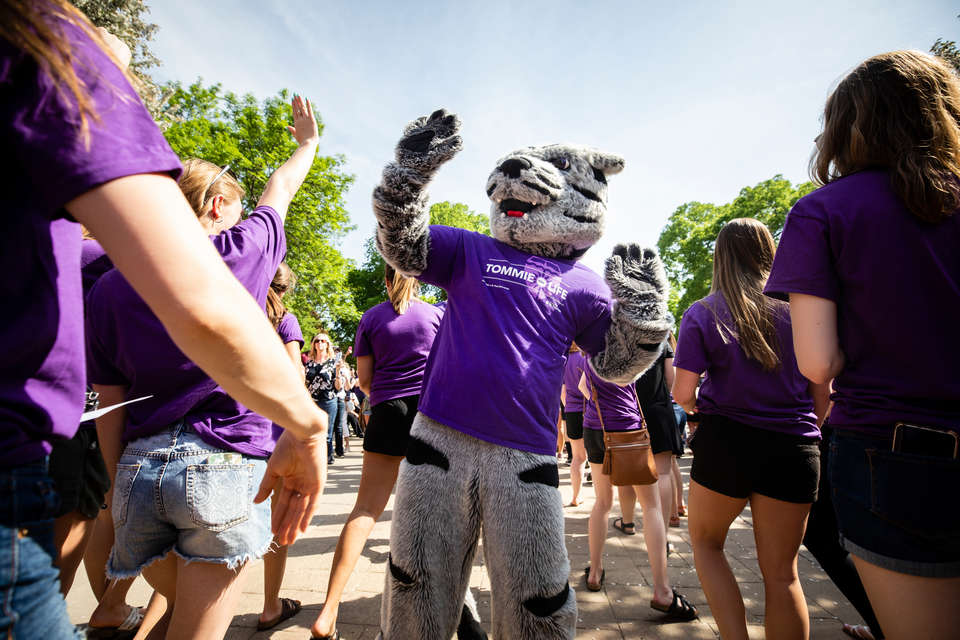Four business school deans gathered in an online hangout this month to discuss the future of the part-time MBA. This event is the third of its kind in a series of online discussions among business school deans. The lively and productive conversation gave each dean an opportunity to showcase their own experiences and perspectives.
Participants:
- Christopher Puto, Ph.D., Dean of the Opus College of Business at the University of St. Thomas
- Joe Phillips Ph.D., Dean of the Albers School of Business and Economics, Seattle University
- Anthony Hendrickson, Ph.D., Dean of the Heider College of Business, Creighton University
- Rob Ryan, Assistant Dean for Graduate Programs at DePaul University.
Below are a few excerpts from the discussion.
"The market has been defined more regionally depending on whether you're in Chicago or Minneapolis or whatever particular locale," said Dean Hendrickson. "But with the growing proliferation of very good online options, that market is expanding and so I think students are now afforded more opportunities--but with more choices comes a more difficult selection process of how do I go about choosing a program?"
"Whatever helps students understand the nature of the experience that a particular school is going to deliver would probably be helpful in the decision," said Dean Puto. "One of my thoughts on how to do that is to see if you could attend a class as a guest and get some experience on what it's like to commute to the campus or commute to the Web if that's what you want. What does it feel like to be in that kind of a class? That would give someone the sense because we're all, I think, talking about 50-plus credit programs in these evening MBA's and that's a pretty big commitment."
"The first thing is we of course commit ourselves to academic excellence, rigor and application of principles, " said Albers' Dean Phillips. "At the same time we want to provide flexibility to our students because it's a very difficult thing to pull off, a part-time MBA program, because you're trying to balance work, you're trying to balance family obligations and you're trying to balance school. We like to think that we know that market and that student petty well."
Hendrickson noted that at Creighton, "We customize a curriculum for each student. So each student has to go through an interview, and based upon what that student's background is and aspirations are from a career standpoint, we then try to craft a curriculum that's designed specifically for them."
At DePaul "what we offer is choice and flexibility," said Ryan. "A student can be full-time day, part-time evening, full-time evening, attend on the weekend and attend at several campuses throughout the Chicago area."
Whereas at St. Thomas, Puto noted, "our flexibility is a little different. We have a solid core that we go through across the basic business disciplines. People can test out of it if they've had the preparations at their previous undergraduate level. But then we also try to have flexibility in terms of electives."
Does theory still matter in an MBA education?
"Without theory we don't have a framework from which to build our questions of inquiry and to build that application that comes from that study of the matter at hand," said DePaul's Ryan. "So without theory to guide us we really are just nothing more than an applied program, which is not going to teach a person how to lead but teach a person how to follow what someone else said before. We want to teach people how to lead."
"The way we approach this is we position theory as understanding why things work and practice as understanding how things work," said Puto. "So if you don't know why things are supposed to be the way they are, you can't diagnose a problem and you can't solve it. But if all you do is come up with a solution and you don't know how to implement your solution, you're only half way there and you haven't accomplished anything. And we wrap this together and say that theory plus practice equals relevance. We’ve positioned ourselves as the relevant program in the Twin Cities."
Online and Blended MBA Program Delivery
"There are certain parts of an MBA that are very difficult to pull off strictly using an online approach," said Phillips. "An interesting thing for us is that as we've tried to roll out more of a hybrid approach in our MBA program, we've gotten a lot of push back from our current students. They are really very adamant about the value other students bring to the classroom. The face-to-face experience is very important to them, so we've been trying to navigate that but still try to move because we really don't think that today's students necessarily tell us about tomorrow's students and what they'll expect and anticipate. So we’re moving to a hybrid, we're not going to the 100% online approach. We see a hybrid as another element of flexibility."
"There is a real value in being in class with students, talking all together with a faculty moderating the discussion and introducing topics and managing those discussions," said Ryan. "Students find a lot of value in that. I don't see that going away. That said, the technology is a very solid assistant and it makes things go better in a lot of ways; the presentations we can do, the research we can do is much better than when I was in school of course."
"One of the things that we're doing is we're trying to distinguish between technology-delivered education and technology-enhanced education," said Puto. "We're hopeful that we can use technology even in the face-to-face course offerings, as I'm sure all of your professors are doing the same thing, to increase the experience the student has outside the classroom without diminishing anything that goes on inside the classroom."
Is a part-time MBAs a lesser academic experience?
"I think the most important advantage you have in the part-time program is the experience that your colleagues and your peers have in the classroom," said Phillips. "It's also up to you as a student to get the most out of the program."







